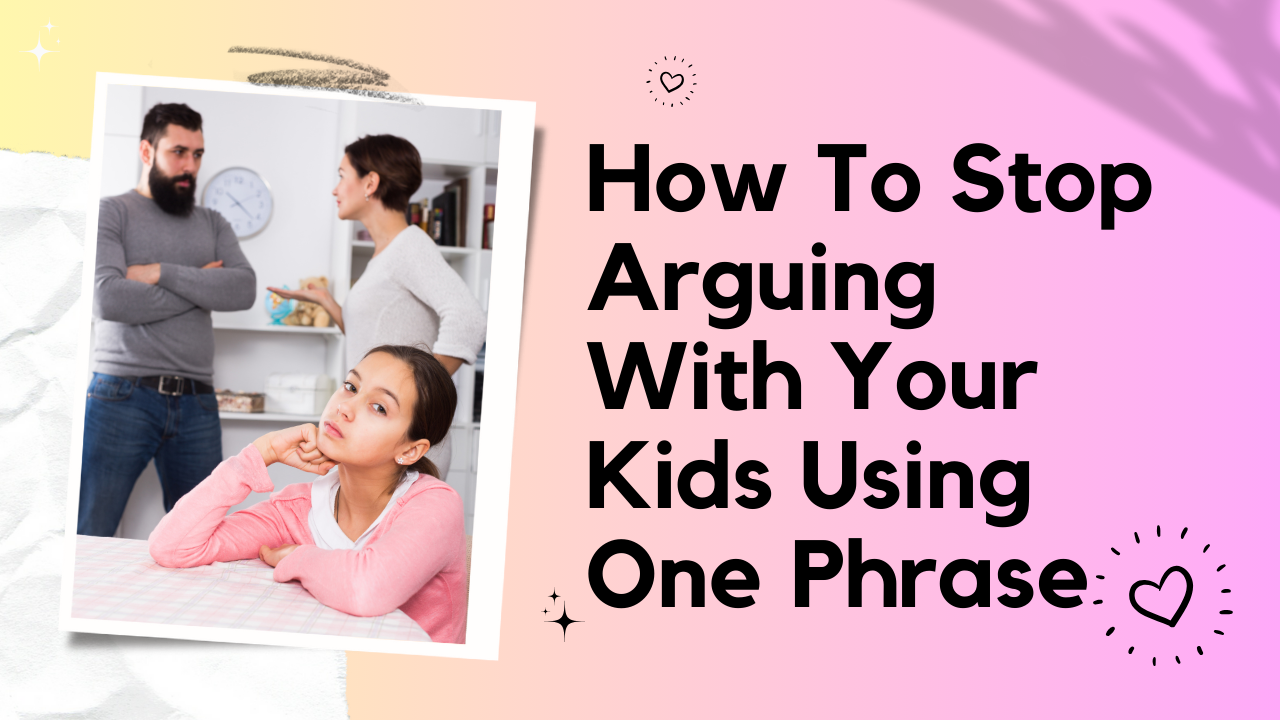How To Stop Arguing With Your Kids Using One Phrase
Introduction
Let’s face it—parenting can feel like a constant tug-of-war, especially when arguments with your kids turn into daily battles. What if there was a way to break this cycle using just one simple phrase? In this article, we’ll explore how this game-changing technique can transform your parent-child relationship and create a calmer, more cooperative home.
Understanding the Root of Arguments
Kids often argue because they’re testing boundaries, expressing frustration, or seeking attention. It’s not just about being defiant—it’s about being heard. As parents, it’s easy to fall into the trap of reacting emotionally, but understanding the “why” behind their behavior is the first step to resolving conflicts.
The Role of Emotions in Arguments
When emotions run high, logic takes a backseat. Kids (and adults!) may say things they don’t mean, escalating the situation. Recognizing this emotional undercurrent can help you approach arguments with empathy instead of defensiveness.
How Arguments Affect Relationships
Frequent arguing can strain your bond with your child, creating a cycle of negativity. By addressing conflicts calmly, you build trust and show them how to handle disagreements constructively.
The Power of a Single Phrase
What Is the One-Phrase Technique?
The magic phrase is: “I see you’re upset. Let’s work together to solve this.”
This simple sentence acknowledges your child’s feelings, diffuses tension, and shifts the focus from blame to collaboration.
Psychological Principles Behind It
This phrase taps into emotional validation—a powerful tool for calming conflicts. When children feel heard and understood, they’re less likely to keep arguing.
Benefits of Using This Method
- Reduces emotional outbursts
- Encourages teamwork
- Teaches problem-solving skills
- Strengthens your bond
How to Implement the One-Phrase Strategy
Recognizing Argumentative Triggers
Pay attention to patterns. Are arguments more likely during rushed mornings or stressful evenings? Knowing your triggers helps you stay prepared.
Timing Your Response
Use the phrase early in the conflict before emotions escalate. This proactive approach prevents arguments from spiraling out of control.
Examples of Effective Phrases
- “I can see you’re upset. Can you tell me what’s bothering you?”
- “Let’s figure this out together. I’m here to help.”
- “I hear you. Let’s find a solution we both like.”
Why This Phrase Works
Emotional Validation and Its Impact
Validating emotions doesn’t mean agreeing with your child’s behavior—it means showing empathy. This reduces defensiveness and opens the door to problem-solving.
Encouraging Collaboration Over Confrontation
The phrase shifts the dynamic from “me vs. you” to “us vs. the problem.” This encourages a team mentality, which is far more effective than power struggles.
Teaching Problem-Solving Through Calm Communication
By modeling calm, solution-focused communication, you’re teaching your child an invaluable life skill they’ll carry into adulthood.
Common Situations Where the One-Phrase Strategy Shines
Morning Routines
Rushing to get out the door? Use the phrase to address resistance without adding stress.
Homework Struggles
When your child refuses to do homework, acknowledge their frustration and brainstorm solutions together.
Bedtime Conflicts
Kids stalling at bedtime? The phrase helps them feel understood while gently guiding them toward cooperation.
Social Media and Screen Time
If screen time becomes a battle, this technique can help you set boundaries without creating resentment.
Tips for Parents to Enhance the Technique
- Stay calm and composed, even if your child doesn’t immediately respond positively.
- Be consistent with your approach to build trust.
- Practice active listening to show genuine interest in their feelings.
The Science Behind the Strategy
Child psychologists emphasize the importance of emotional validation in fostering healthy relationships. Studies show that children who feel heard are more likely to cooperate and develop emotional resilience.
Overcoming Initial Resistance
How Kids Might React Initially
Your child might test your resolve by continuing to argue. Stay patient and stick to the phrase—it will pay off over time.
Steps to Stay Persistent
If the technique doesn’t work right away, don’t give up. Consistency is key. Each interaction builds a foundation of trust and understanding.
Real-Life Success Stories
Countless parents have shared stories of how this simple shift transformed their homes. From fewer tantrums to better communication, the results speak for themselves.
Additional Tools to Support Communication
- Active Listening: Show that you’re genuinely paying attention.
- Positive Reinforcement: Praise cooperative behavior to encourage more of it.
- Clear Boundaries: Consistent rules create a sense of security.
What Not to Do When Arguing with Kids
- Avoid Yelling: It only escalates the situation.
- Don’t Punish Emotion: Teach them to express feelings constructively instead.
- Stay Open-Minded: Try to see things from their perspective.
The Role of Emotional Intelligence in Parenting
Teaching kids to manage emotions starts with you. By staying calm and empathetic, you set a powerful example for them to follow.
Long-Term Benefits of Reducing Arguments
Over time, this approach builds a stronger, more trusting relationship with your child. It also creates a more peaceful home environment where everyone feels respected and understood.
Conclusion
Arguments with your kids don’t have to be a daily struggle. By using a simple, empathetic phrase, you can transform conflicts into opportunities for connection and growth. Start practicing this strategy today, and watch as your home becomes a more harmonious space.
FAQs
- What is the best phrase to stop arguments with kids?
“I see you’re upset. Let’s work together to solve this” is highly effective for calming conflicts. - Can this method work for teens as well as younger kids?
Absolutely! The technique is versatile and works across age groups. - How long does it take for this strategy to show results?
Consistency is key. Many parents notice improvements within a few weeks. - What if my child doesn’t respond well to this phrase?
Stay patient and persistent. It takes time for some kids to adjust to new approaches. - Are there other techniques that complement this approach?
Yes, active listening and positive reinforcement are great additions to this method.







